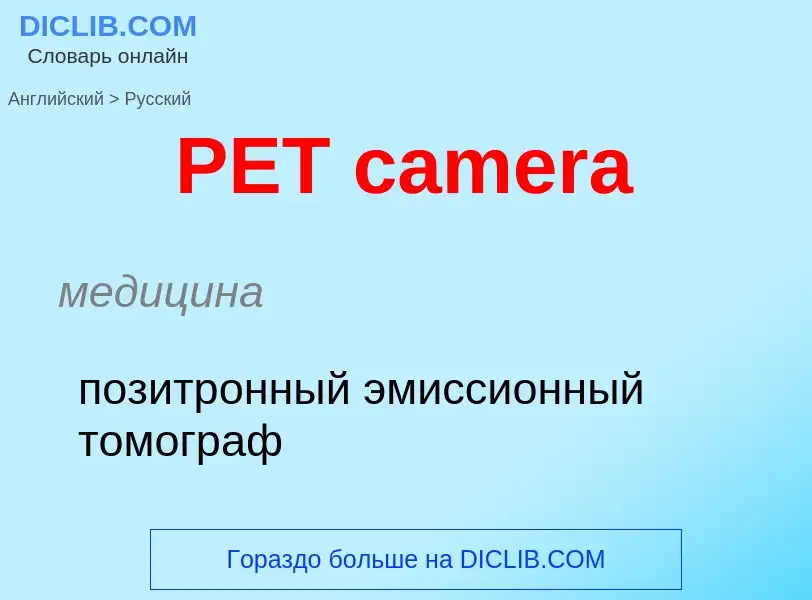Übersetzung und Analyse von Wörtern durch künstliche Intelligenz ChatGPT
Auf dieser Seite erhalten Sie eine detaillierte Analyse eines Wortes oder einer Phrase mithilfe der besten heute verfügbaren Technologie der künstlichen Intelligenz:
- wie das Wort verwendet wird
- Häufigkeit der Nutzung
- es wird häufiger in mündlicher oder schriftlicher Rede verwendet
- Wortübersetzungsoptionen
- Anwendungsbeispiele (mehrere Phrasen mit Übersetzung)
- Etymologie
PET camera - Übersetzung nach russisch
медицина
позитронный эмиссионный томограф
общая лексика
пластиночный фотоаппарат
[pi:v]
существительное
[pi:v]
общая лексика
раздражение, раздраженное состояние
жалоба
разговорное выражение
раздражение
обида
раздражённое состояние
глагол
общая лексика
раздражать, надоедать
разговорное выражение
раздражать
надоедать
обижать
Definition
Wikipedia

A camera is an optical instrument that captures images. Most cameras can capture 2D images, while some more advanced models can capture 3D images. At a basic level, most cameras consist of a sealed box (the camera body), with a small hole (the aperture) that allows light to pass through and capture an image on a light-sensitive surface (usually a digital sensor or photographic film). Cameras have various mechanisms to control how light falls onto the light-sensitive surface, including lenses that focus the light and a shutter that determines the amount of time the photosensitive surface is exposed to the light.
The still-image camera is a key instrument in the art of photography. Captured images may be reproduced later through processes such as digital imaging or photographic printing. Similar artistic fields in the moving-image camera domain include film, videography, and cinematography.
The word camera comes from camera obscura, which is Latin for "dark chamber" and refers to the original device used to project a 2D image onto a flat surface. The modern photographic camera evolved from the camera obscura. The first permanent photograph was made in 1825 by Joseph Nicéphore Niépce.



![[[Arri Alexa]], a digital movie camera [[Arri Alexa]], a digital movie camera](https://commons.wikimedia.org/wiki/Special:FilePath/Arri Alexa camera.jpg?width=200)

![Zeiss]] lens Zeiss]] lens](https://commons.wikimedia.org/wiki/Special:FilePath/Hasselblad 500 CM.jpg?width=200)
![Leica]] c. 1936 Leica]] c. 1936](https://commons.wikimedia.org/wiki/Special:FilePath/Leica IIIa Rangefinder.jpg?width=200)
.jpg?width=200)



![Sony HDR-HC1E, a [[HDV]] camcorder. Sony HDR-HC1E, a [[HDV]] camcorder.](https://commons.wikimedia.org/wiki/Special:FilePath/Sony Handycam HDV digital camcorder HDR-HC1E.jpg?width=200)
